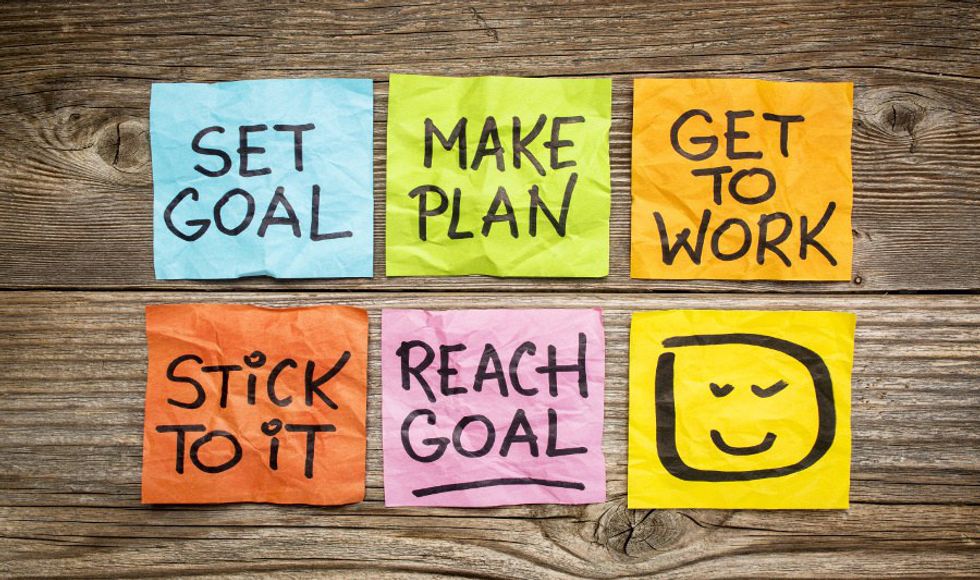1. Make SMART Goals
You need to have goals. You have to achieve your goals. Take a look at your classes and your schedule and rank your classes from hardest to easiest. Set a desired grade (a grade you will be satisfied to have on your transcript) to have by mid-terms and finals. Unless all the classes are equally hard, the harder classes need higher priority because it will be harder to get your desired grade in that class. For example, two of my desired grades were a B in elementary Spanish and a C in biology: anatomy & physiology during my freshmen semester. I finished with an A in Spanish and a C in the biology course. Your goals should be SMART (specific, measurable, attainable, relevant, and time-bound).
2. Go To Class
Going to the class helps you attain your goals. It is fine to have a few skip days because you may need a rest, but do not skip too often. Skipping a class every week is not a good idea. You are paying for the class, so you might as well get your money’s worth. More importantly, professors give attendance grades. There have been students who lost an A in the class because their attendance was low. Also, you never know when the professor may give bonus points or food to the students who came to class. Professors notice the students that attend class and are more willing to help a struggling student that comes to class frequently.
3. Study, Study, Study
I can’t stress how important studying is for a college student. Studying is the difference maker between a B and a D. Yes, there are the easy classes that don’t require much studying time. Then, there are your higher priority classes that take up a lot of studying time. Examine your study habits. Find an effective study method that will help you achieve your goals.
4. Befriend Classmates
Your classmates are in the same boat as you. Some of them will take more classes with you in the future, and some of them will take only one class with you. Since you are in the same boat, it would be beneficial to help each other along the way. I became friends with a guy in my University Seminar 1001 class. Now, we look to each other as brothers. Pick one or two classmates that you can go to for help, or be the person that delivers the help.
5. Buy the Textbooks
It is frustrating when the syllabus states that the textbook is required for the course, but the professor used the textbook once (or not at all). Sometimes, the textbook is important because a professor can teach from the Power Points but give exams from the textbook. The necessity of textbooks varies from class to class. If you want to save money, then buy the textbook at a cheap store, or do not buy the textbook. If you want to save your grades, buying the textbooks should be on your to-do list.
6. Get Some Exercise, Not Extra Fries
Exercising reenergizes your brain and its thought processing. We all need to think better when it comes to that hard exam on a Monday and during the two exams you have on the same day during finals week. Exercising helps relieve stress. You can also study during some of the exercises. The treadmill, elliptical, and bicycle aids those in need of exercise and study time.
7. Get And Use A Planner
When you get a planner, you should actually use it. Let your planner become one of your best friends. Planners remind you when there is an exam, when the assignment is due, when you do not have to come to class, and when the project is due. A planner informs you about your other non-school duties and obligations.
8. Avoid Procrastination
If you are actively using your planner, staying up-to-date would be an easier task. You will know when the assignments are due and when is the next exam. Doing the assignments and studying for the exams are the problems. We procrastinate on studying. We procrastinate on going to class. We procrastinate on turning assignments in. We procrastinate on reading the chapter that was supposed to be read two weeks ago. Occasionally, our best work and good ideas come at the last minute, so we may get lucky and get by on a procrastinated assignment. Procrastination can ruin the good intentions you had of getting that A in college algebra. Sometimes, math problems take a lot longer than they should. Use effective time management skills. Give yourself more time than you think you will actually need.
9. Watch What You Eat
Good eating habits are almost equally important as good studying habits. Eating tacos may not help you learn how to conjugate “comer” on your Spanish homework. However, your eating habits play a role in how you comprehend information. There have been countless times when I couldn't pay attention in class because my hunger was forcing me to think of my next meal. Remember that breakfast is the most important meal of the day for reason. Several breakfast foods enhance your cognitive process and provide much need energy for the day. Another key component of breakfast foods is memorization. We love to take exams based off of how much we can remember. Breakfast can enhance your short-term memory.
10. You Need Sleep
Everyone’s biological clock is different, but everyone needs sleep at some point in the day. Lack of sleep hinders the brain’s ability to function properly. How will you pass your exam if your mind is not focused? What if you stay up all night studying for your exam and fall asleep during the exam? Get some sleep. Let the amount of sleep you get be similar to how many hours your body needs to effectively function.















 StableDiffusion
StableDiffusion
 StableDiffusion
StableDiffusion
 student thinking i shouldnt have procrastinated all semester
StableDiffusion
student thinking i shouldnt have procrastinated all semester
StableDiffusion
 Photo by
Photo by  Photo by
Photo by  Photo by
Photo by  StableDiffusion
StableDiffusion
 StableDiffusion
StableDiffusion
 Photo by
Photo by  Photo by
Photo by 


 Lumiere figure at the Disney Store at the Ala Moana Shoppi… | Flickr
Lumiere figure at the Disney Store at the Ala Moana Shoppi… | Flickr








 StableDiffusion
StableDiffusion StableDiffusion
StableDiffusion 10. Extra BlanketsJuwenin Home 100% Cotton Knitted Throw Blanket
10. Extra BlanketsJuwenin Home 100% Cotton Knitted Throw Blanket StableDiffusion
StableDiffusion StableDiffusion
StableDiffusion File:Kishlaru familie.jpg - Wikimedia Commons
File:Kishlaru familie.jpg - Wikimedia Commons Photo by Hanna Balan on Unsplash
Photo by Hanna Balan on Unsplash StableDiffusion
StableDiffusion black blue and yellow round illustrationPhoto by
black blue and yellow round illustrationPhoto by 













